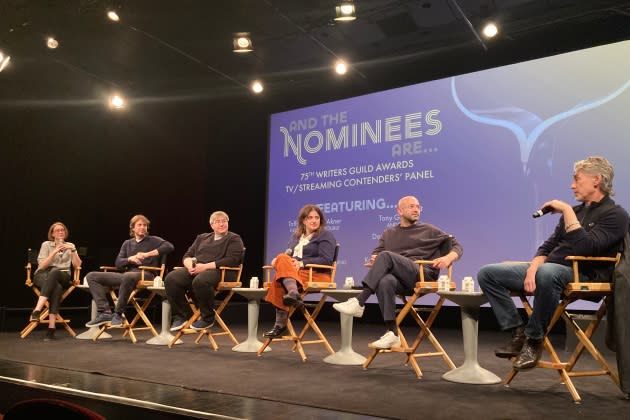‘Andor’ Creator Tony Gilroy Says “Exciting” Freedom Of Streaming Era Is Reshaping The Industry Ahead Of WGA Strike Talks: “It’s Absolute And Utter Chaos”
- Oops!Something went wrong.Please try again later.
- Oops!Something went wrong.Please try again later.
- Oops!Something went wrong.Please try again later.

Writer and director Tony Gilroy, who most recently created Andor for Disney+, sees “chaos” reshaping the entertainment industry. The good kind.
“We’re in a total free-form right now. I don’t think anything matters whatsoever,” he said during a WGA-hosted panel in New York. “I think what’s happening right now is not just happening on the screen or on the page or in this room. I think it’s happening in business as well, which we’re all going to be at the meeting — you know, the strike and everything — I think it’s absolute and utter chaos right now. I think anything goes. I don’t think there are any rules. I think it’s so frickin’ exciting that it doesn’t matter if you — two episodes, an episode and a half, five episodes, this, that, a play — it doesn’t matter! I don’t think there are any rules.”
More from Deadline
WGA To Hold Two More Membership Meetings This Week Ahead Of Contract Talks
800 WGA West Members Attend Second Membership Meeting About Upcoming Contract Talks
Gilroy’s passing allusion to the possible writers strike was the only reference to labor negotiations during the 90-minute session at the SVA Theatre. The theater is one of the venues where the guild is convening membership meetings this week ahead of the start to negotiations. No date has been specified for the talks, but the current WGA contract expires May 1. While the main panel discussion was followed by a question-and-answer period, a WGA rep told Deadline that members of the press were discouraged from participating in the Q&A (lest they pose any strike questions, presumably).
Along with Gilroy, the panel featured WGA Award nominees Taffy Brodesser-Akner (Fleishman is in Trouble), Antonio Campos (The Staircase), Madeleine George (Only Murders in the Building) and Daniel Goldfarb (Julia). The 75th edition of the awards will be held March 5, in co-ordinated but separate ceremonies in New York and LA.
Goldfarb said the creative freedom involved in making episodic work has increased exponentially since the days when four broadcast networks dominated and cable TV was nascent. “Now, something doesn’t have to be a comedy. It doesn’t have to be a drama. It can be both. And then they can decide how to sell it. It can be 45 minutes, it doesn’t have to be an hour. It doesn’t have to be 23 minutes,” he said. “It’s wild to untrain your brain to think in the pattern that you grew up with. … The ‘no rules’ aspect of that is very freeing and exciting.”
Vulture critic Kathryn VanArendonk moderated the panel.
Best of Deadline
Sign up for Deadline's Newsletter. For the latest news, follow us on Facebook, Twitter, and Instagram.
